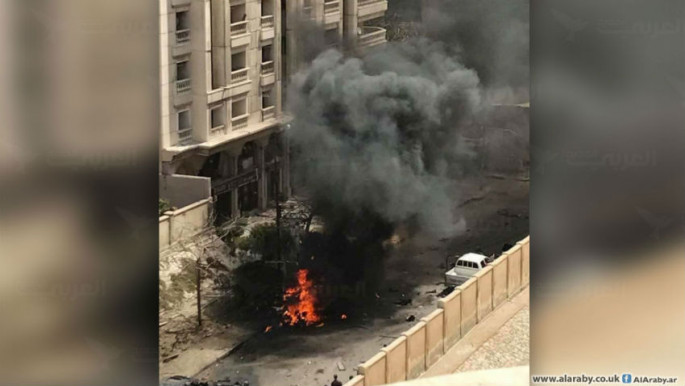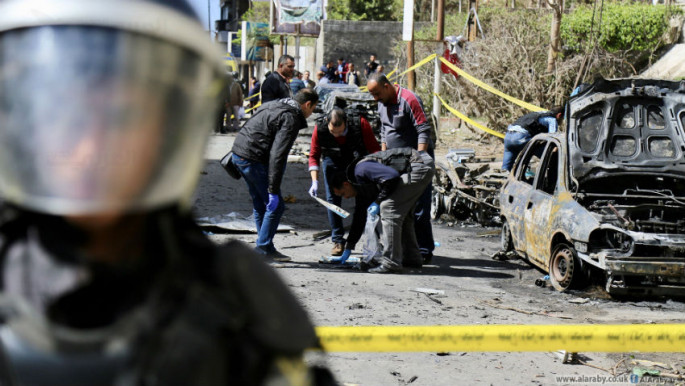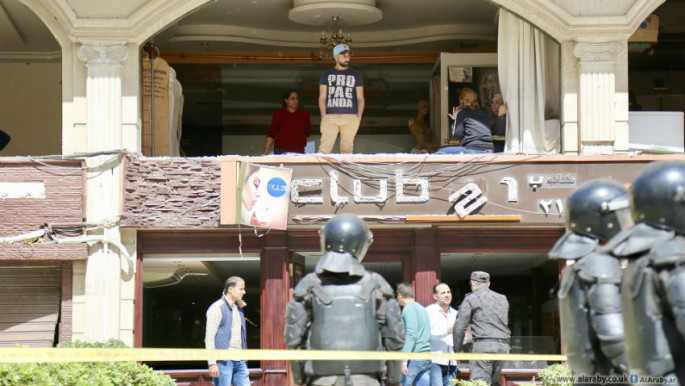Egypt's Alexandria bombing an 'assassination attempt'
A spokesman for the Egyptian Interior Ministry said that a bomb placed under a car on Saturday morning had exploded while parked on Al-Moaskar Al-Romani street near the Sidi Gaber Police Department in the Roshdy neighbourhood of Alexandria, al-Araby al-Jadeed reported.
The car bomb exploded near a convoy transporting General Mostafa el-Nemr through a residential area of the Mediterranean city, the government press office said.
Nemr was not among the casualties of the "terrorist bombing that targeted the convoy", his office said, quoted by state-owned newspaper Al-Ahram.
Health ministry spokesman Khaled Megahed said the casualties were taken to a military hospital.
Nemr himself, escorted by guards, appeared on Egyptian television visiting the scene shortly after the attack.
Prosecutor General Nabil Sadek ordered an "urgent and wide inquiry."
 |
|
|
Pictures of the blast show the street enshrouded by clouds of black smoke [al-Araby al-Jadeed]
|
Photographs taken by al-Araby al-Jadeed show black smoke rising above the site of the attack near a police station on Al-Moaskar Al-Romani street.
Security and military units quickly cordoned off the area of the attack, which left several burnt-out cars. Police forensics experts were examining the vehicle used for the bombing.
The Alexandria Governate issued a security alert in the wake of what it called an "assassination attempt" of General el-Nemr, according to al-Araby al-Jadeed.
Egypt's Interior Minister Major General Magdy Abdul Ghaffar announced a thorough security crackdown in the governate, including hotel raids, and searches using dogs.
 |
|
|
Forensic officers comb the street for evidence [al-Araby al-Jadeed]
|
There was no immediate claim of responsibility for the blast, which came ahead of Egypt's presidential election starting on Monday, in which incumbent Abdel Fattah al-Sisi is expected to sweep to a second term in office.
Sisi stormed to victory in a 2014 poll, a year after leading the military in ousting Egypt's first freely elected leader, the Muslim Brotherhood's Mohamed Morsi.
Since the ouster of Morsi and a crackdown on his party, security forces have sought to quell attacks by Islamist militants.
The Ansar Beit al-Maqdis group, which has declared allegiance to Islamic State (IS), has killed hundreds of soldiers, policemen and civilians, mainly in its North Sinai stronghold, but also elsewhere in Egypt.
IS claimed the 2015 bombing of a Russian airliner carrying tourists from the South Sinai resort of Sharm el-Sheikh, which killed all 224 people on board.
 |
|
| Alexandrian residents observe the damage inflicted by the powerful blast to the residential neighbourhood [al-Araby al-Jadeed] |
It has also killed scores of members of Egypt's minority Coptic Christian community in church bombings and shootings.
Last April 9, during Palm Sunday celebrations, suicide bombers killed 45 worshippers in attacks on churches in Alexandria and Tanta, also north of Cairo, since when Egypt has been under a state of emergency.
Sisi gave the armed forces and police a three-month deadline in November to wipe out the jihadists.
The president's ultimatum came after suspected IS gunmen massacred more than 300 worshippers in a Sinai mosque associated with Sufi Muslims, seen by IS as heretics.
The deadline has since been extended and the armed forces have launched their most comprehensive campaign yet to end the five-year-old jihadist insurgency.
The military gives regular updates on the operation, saying it has killed more than 100 jihadists so far while losing at least 20 troops.
Agencies contributed to this report





![Netanyahu furiously denounced the ICC [Getty]](/sites/default/files/styles/image_330x185/public/2024-11/GettyImages-2169352575.jpg?h=199d8c1f&itok=-vRiruf5)
![Both Hamas and the Palestinian Authority welcomed the ICC arrest warrants [Getty]](/sites/default/files/styles/image_330x185/public/2024-11/GettyImages-2178351173.jpg?h=199d8c1f&itok=TV858iVg)
